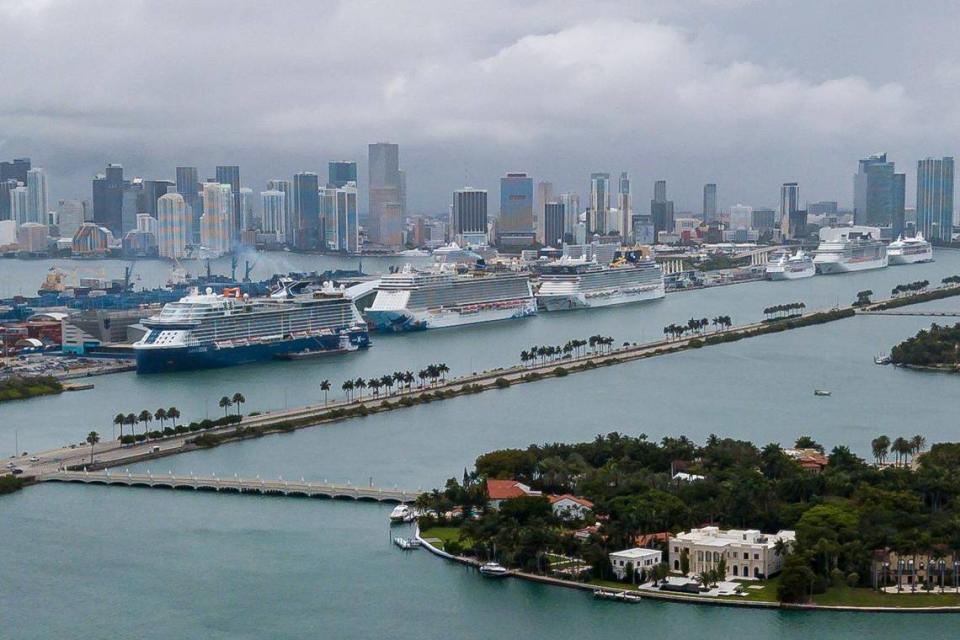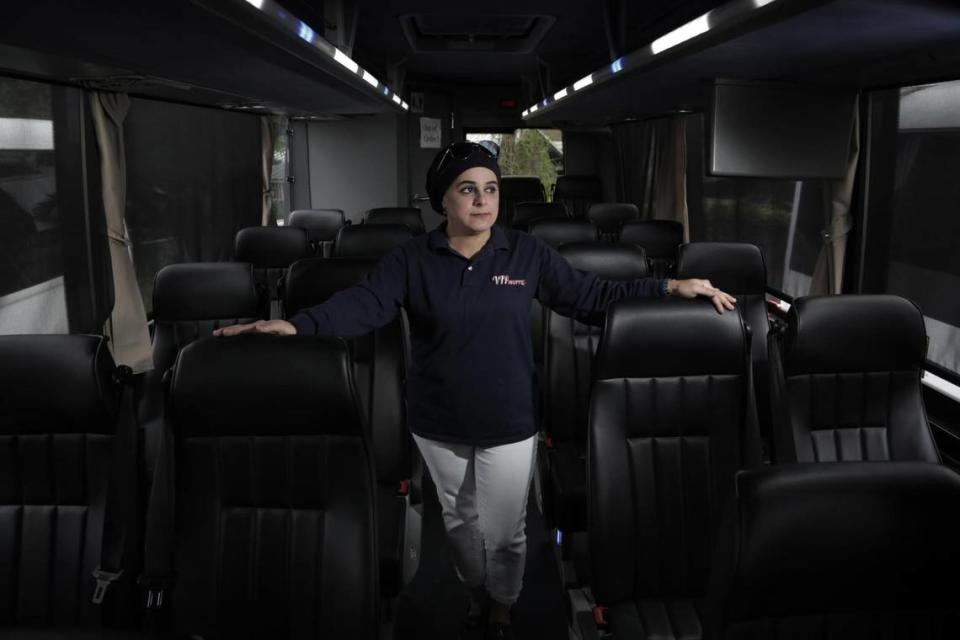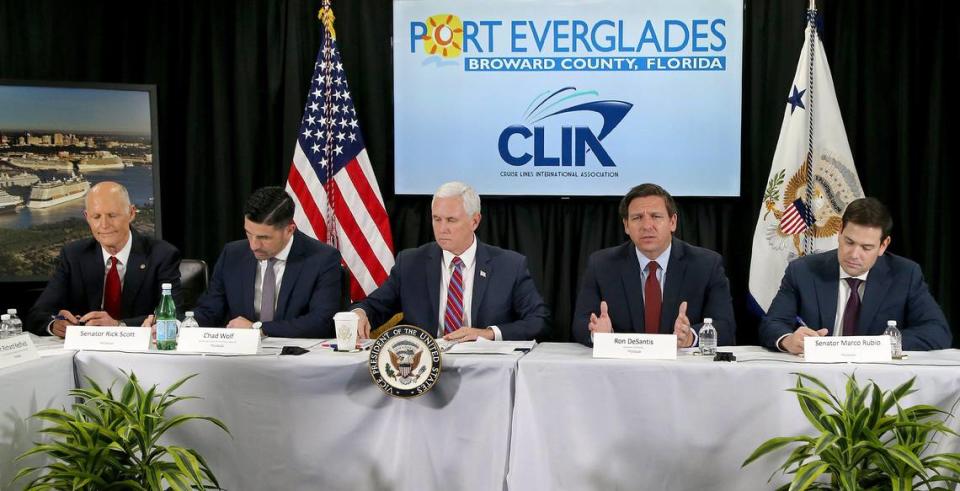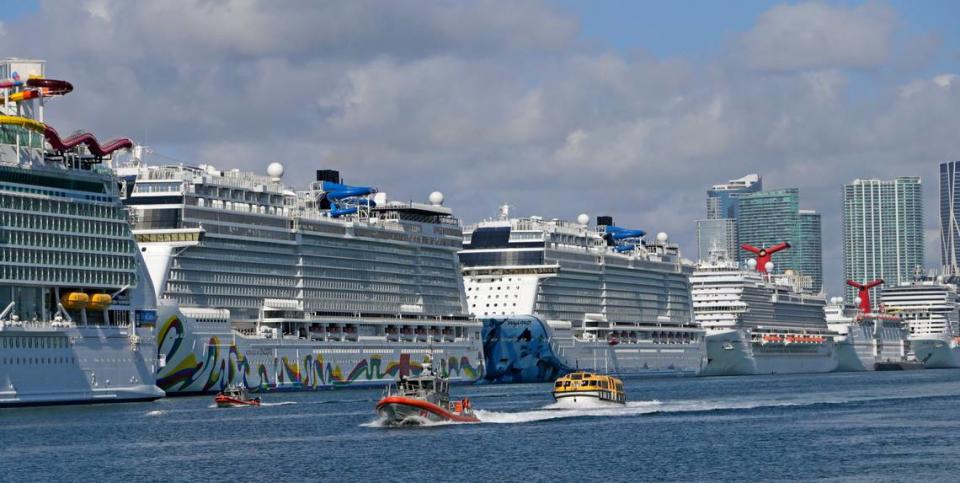DeSantis sues CDC to get cruises restarted. Experts call it a ‘political stunt’
- Oops!Something went wrong.Please try again later.
Florida Gov. Ron DeSantis announced Thursday he is suing the federal government in a long-shot attempt to get the U.S. Centers for Disease Control and Prevention to allow cruising to resume immediately.
Cruise companies were caught off guard by DeSantis’ suit. No cruise lines attended a press conference Thursday at PortMiami at which DeSantis announced the litigation, which legal experts consider a political stunt.
“Today Florida is fighting back,” said DeSantis, who was flanked by Attorney General Ashley Moody, U.S. Rep. Carlos Gimenez and Miami-Dade County Commission Chairman Jose “Pepe” Diaz. “We don’t believe the federal government has the right to mothball a major industry for over a year based on very little evidence and very little data. I think we have a great chance for success.”
Cruises in the U.S. have been banned since mid-March 2020 after COVID-19 outbreaks and deaths on multiple ships. Now cruise companies are working to comply with the second phase of the CDC’s “conditional sail order” — a framework to get the industry restarted first published in October. Last week, the CDC released requirements for agreements cruise companies must secure with U.S. ports and local health authorities in the cities they plan to visit.
In an interview Monday, the head of the CDC’s maritime division, Martin Cetron, said if vaccination supply and distribution continue to accelerate and deadlier COVID-19 variants are kept at bay, the agency could allow for passengers to board cruise ships as soon as July. Cruise companies say they are confident they can operate safely by then, too.
Miami-Dade Mayor Daniella Levine Cava said she doesn’t support DeSantis’ lawsuit.
“The tens of thousands of jobs in our community supported by the cruise industry are too important to be jeopardized by politics,” she said in a statement. “...We are encouraged by recent conversations with the CDC laying out a roadmap for a safe return to sailing, including recent signs pointing to a hopeful July restart, and will continue our dialogue with the CDC and our industry partners to get cruises back in the water.”

Some cruise companies frustrated with the CDC’s process are planning to start cruises from Caribbean ports as soon as June, a move DeSantis said he doesn’t want to see continue any longer.
“Instead of flying to Miami, spending money to stay in our hotels, spending money to eat in our restaurants before they get on the ship, they’re going to fly to The Bahamas, and they’re going to get on the ships from the Bahamas, and they’re going to spend money in the Bahamas,” said DeSantis. “And they’re going to do the same thing they would have done, it just won’t be helping the state of Florida and it won’t be helping our folks here who really depend on it.”
‘Negligible viability’
As the cruises remain passenger-less in U.S. ports, the cruise economy associated with PortMiami remains largely stalled. Before the ban, around 60,000 South Floridians worked for the cruise lines or as shuttle drivers, longshoremen, travel agents and others who support the industry. Many have seen their hours cut or their jobs disappear entirely.
The lawsuit filed Thursday in the U.S. District Court for the Middle District of Florida in Tampa against the Department of Health and Human Services, the CDC, and the agencies’ directors, said the state has distributed around $20 million of unemployment benefits to at least 6,464 former cruise industry employees since March 1, 2020. It asks the court to declare the conditional sail order unlawful, arguing cruise lines “are on the brink of financial ruin” and should be able to operate immediately with “reasonable safety protocols.”
This week the CDC gave the green light to vaccinated Americans to resume air travel, but its Level 4 travel warning — the agency’s highest — for cruise travel remains in place. The CDC declined to comment on the lawsuit.

Industry analysts estimate that despite record financial losses, cruise companies have raised enough capital during the pause in operations to last at least another year without U.S. cruises.
Legal experts say the lawsuit has very little chance of proceeding. The federal government has broad control to regulate ports of entry and international commerce.
“I think it’s got negligible viability approaching zero,” said Larry Gostin, professor of global health law at Georgetown University and director of the World Health Organization’s center on global health law. “Under no circumstance could I see a judge striking down a regulation that applies to cruise ships and the safety of its passengers because its passengers are going to be introducing infectious diseases back into the U.S. if they get infected on the ship. The U.S. has a very strong interest and power to stop that.”
Then there’s the issue of standing. While cruise companies may be able to successfully argue they are victims of the federal government’s regulations, the governor is unlikely to be able to make the same argument.
“It’s a political stunt, and it’s not viable,” said Bob Jarvis, a constitutional law professor at Nova Southeastern University. “DeSantis doesn’t care that it’s gong to be laughed out of court. By the time it gets dismissed his base will have moved on.”
Vaccination mandates
In contrast, cruise companies say they prefer a collaborative approach with the CDC. Last Friday, when DeSantis first threatened to sue the agency at a press conference at Port Canaveral, he was joined by representatives from all of the major cruise lines. When he announced the lawsuit Thursday, no one from the industry was there.
During the first phase of the conditional sail order, cruise companies with ships in U.S. waters tested their crew members weekly for COVID-19 and reported results to the agency, helping inform the next phase.

“We are aware of the lawsuit and share the sense of urgency of getting Americans back to work,” said Carnival Corporation spokesperson Roger Frizzell in an email. “Our focus is trying to work with the CDC on a plan to resume cruise operations this summer.”
In a bid to accelerate approvals to resume cruises, several companies, including Virgin Voyages, Royal Caribbean Group, Norwegian Cruise Line Holdings, Windstar and Crystal Cruises, have announced they will require some or all passengers and crew members to be vaccinated. In the CDC’s most recent guidance, the agency recommended all passengers and crew be vaccinated, but said it will not mandate it.
DeSantis said Thursday he objects to cruise companies requiring vaccines. Last week he signed an executive order prohibiting businesses from requiring customers to provide any documentation that they’ve gotten a COVID-19 vaccine to gain access or service.
Royal Caribbean Group spokesperson Jonathon Fishman said in an email that the company is aware of many efforts to get cruises operating again in the U.S., and reiterated its intent to require vaccinations.
“Vaccinations layered on top of the rigorous health and safety measures we are implementing enable us to create a safe environment for cruising,” he said in an email. “We strongly believe that the cruise industry can be part of President Biden’s stated goal for society to reopen by July 4.”

White House press secretary Jen Psaki said President Joe Biden’s goal of getting enough Americans vaccinated to be able to safely gather for the Fourth of July holiday is unrelated to the cruise industry.
In response to a question about whether the White House has any specific concern about allowing vaccinated individuals to cruise, she said, “We rely on the guidance of the CDC, health and medical experts. There’s a return to science in this administration. [CDC officials] have guidelines they’ve put out on cruises, cruise lines. ... If they decide to update them, that is their prerogative to do, but that’s not a decision made by the White House.”
Cruises have already resumed elsewhere during the pandemic, including in Singapore, Italy and China, with minimal outbreaks, according to the Cruise Lines International Association, the industry’s lobbying group.
In a statement, CLIA spokesperson Laziza Lambert said, “CLIA is grateful for Governor DeSantis’ support of the cruise community and we appreciate his efforts to restart cruising safely.”
McClatchy White House correspondent Francesca Chambers contributed to this report.

